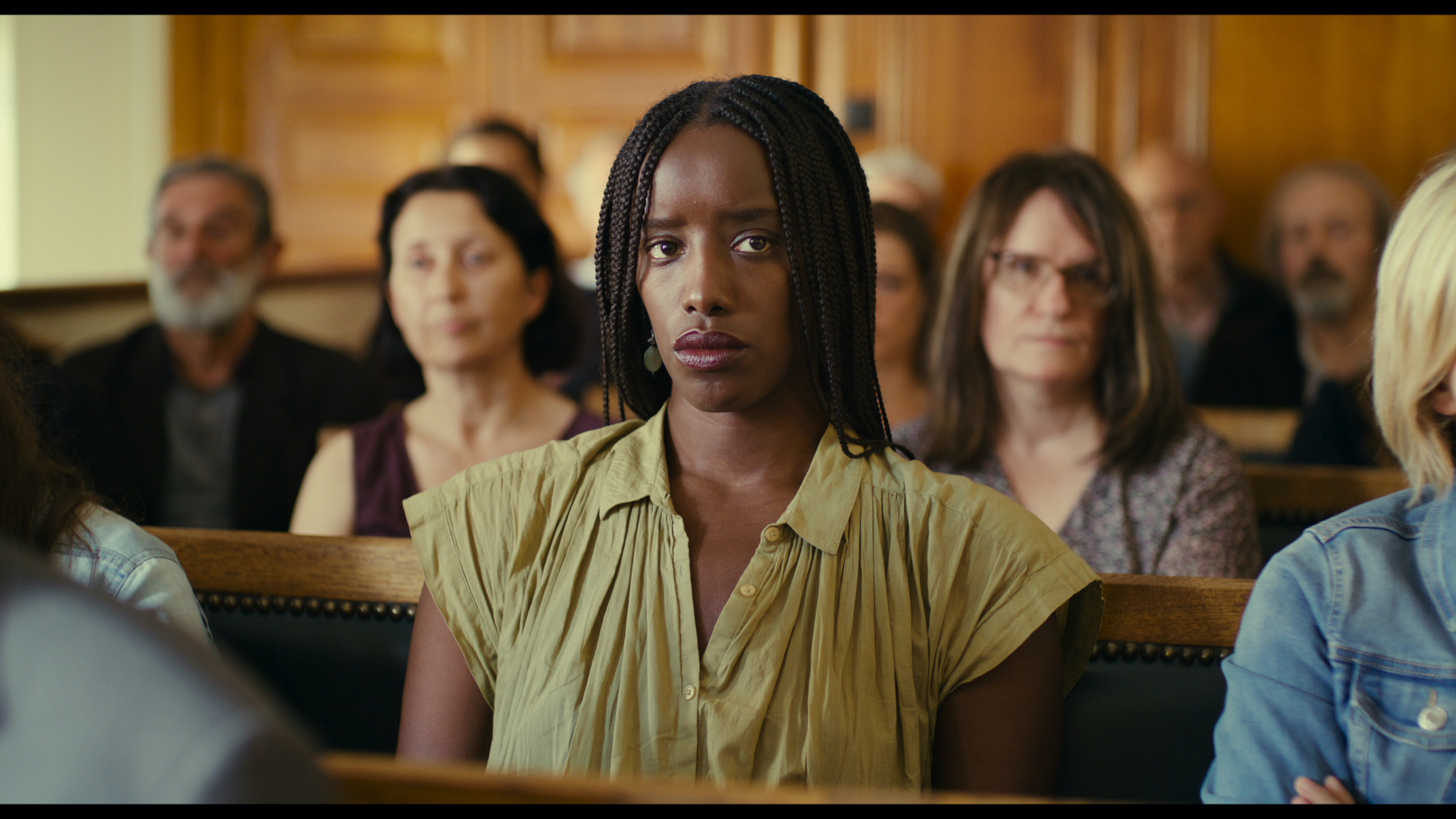Kayije Kagame on Saint Omer: „We never cared about sending a message but rather to explore a profound mystery”
The actress speakes about her debut in feature film and working with Alice Diop.
Kayije Kagame is a Swiss artist and a very profound and creative human being. Born in Switzerland, she studied theatre in Geneva and Lyon and later on took part in Robert Wilson’s Watermill International Summer Program Residency in Long Island, USA and in the artists’ residence at the Cité Internationale des Arts in Paris. She is the creator of numerous performances, sound pieces, films, and installations and in 2021 she debuted in her first feature film – Saint Omer, directed by Alice Diop and winner of the Silver Lion Grand Jury Prize at Venice 2022. The film tells the story of Rama (K. Kagame), a pregnant young novelist who attends the trial of Laurence Coly (Guslagie Malanda), a Senegalese woman accused of murdering her 15-month-old baby by leaving her on a beach to be swept away by the tide. It is based on the French court case of Fabienne Kabou, who was convicted of the same crime. Alice Diop attended Kabou’s trial in 2016.
I met with Kayije at Berlinale this year, where she participated in EFP’s programme for actors – Shooting Stars; it was around midday and Kayije was giving interviews for over 6 hours now. Visibly tired, Kayije made an effort to answer all of my questions with a lot of patience and consciousness, so by the end of the interview, we were both laughing about the difficult and tiring day she had. We talked about her life, both personal and artistic, and about her debut in Saint Omer, which just had its premiere in Romanian cinemas on the 2nd of June.
***
Tell me a little bit about you, Kayije. What’s your story?
I was born in Switzerland and grew up in Geneva, but my parents are originally from Rwanda. I studied theatre in Geneva, then in Lyon at the National School of Theatre, and when I graduated, I started working with visual artist and director Robert Wilson. It was like a second school to me, working with him. It helped me decide to become an actress and also a director in various artistic mediums. And I like very much what I’m doing now.

Have you ever felt mistreated, growing up in a country dominated by Caucasians, just because you are a woman of color?
Of course. A black woman living in a predominantly white society can undoubtedly face injustices because of her skin colour. Fortunately, in my career, I managed to always find people that I trust and that make me feel comfortable, with whom I share an artistic vision.
Saint Omer marks your acting debut in a feature film. Has this experience brought anything new into your artistic life?
I think that whether I work in cinema, visual arts, or theatre, I’m always the same, true to my inner soul, to myself, always involved in the same way, it’s just the project that changes. I actually met Alice Diop by chance, and Saint Omer was obviously a huge project for me. It gave me faith in continuing what I’m doing.
How did you meet Alice Diop?
In an independent cinema, where I went to watch her film. We talked for a little bit, she told me she was working on a project and asked for my contact. We started to discuss a lot and became very close, I think this was three years before the shooting of the film. It’s a very strong and profound story, I’m very glad to see it finds its success, in a very natural way.
Saint Omer is based on a case that Alice witnessed in 2016. How much did she tell you about it?
We talked a lot. I was captivated by the way she approached this story, with care and philosophy. A lot of people think that Alice Diop is Rama, but she told me from the beginning it is not her. Of course, any creator puts a lot of himself/herself in his/her work but what was beautiful here was that the whole character has been invented during the shooting of the film. The script didn’t have much dialogue, so I had to create Rama, everything she felt. It was great to have the opportunity to be part of this beautiful idea and have the freedom to make it my own.
In your personal opinion, do you think Laurence is guilty of the murder of her daughter?
I don’t think my personal opinion matters at all. The film explores this issue in all its complexity.

The movie made me believe that it was not her fault and I like how she keeps fighting for her point of view, she’s a strong woman. And Saint Omer is definitely the best film I’ve seen at Venice, last year. And speaking of, how was Venice for you?
It was the first time that people saw our film, I felt a lot of fear at first, and excitement, of course. The movie is unique, I like to think of it as an art piece, so people could have hated it and not understand it. I remember the silence during the first screening, how I could feel the intensity of the movie. It was even stronger than the applause at the end. It’s a film that gives you space to think about it. Laurence is a character that you don’t know much about at the end, even if you see her in court, answering all these intimate questions. We never cared about sending a message, nor giving answers. Rather, to explore a profound mystery.
Film producer and founder of ADFR, she dreamed since she was little of having a magazine one day. Alongside her job as editor-in-chief, she writes the interview of the month. She loves animals, jazz music and films festivals.
